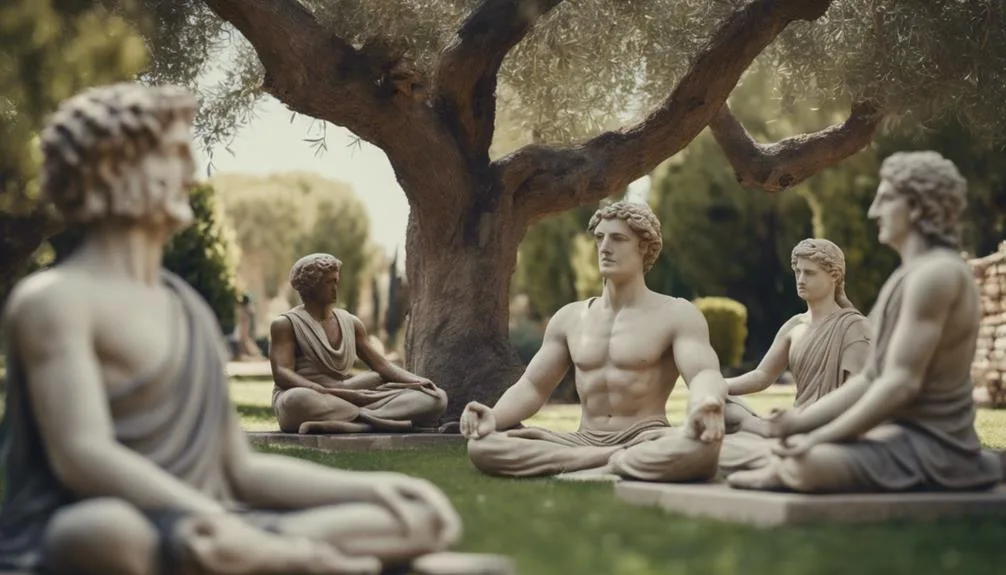Ancient Greek Philosophy on Mindfulness: Lessons for Today
You might think that the ancient Greeks had a crystal ball, so precisely do their teachings on mindfulness resonate with today's fast-paced, often overwhelming lifestyle. Their wisdom, particularly the concept of sophrosyne—which champions balance, self-control, and soundness of mind—offers you a blueprint for navigating the tumult of modern existence with grace.
By embracing these age-old principles, you can cultivate a sense of calm and intentionality in your life, a feat that seems all but impossible in our current era. Let's explore how these ancient philosophies can illuminate a path to a more mindful, balanced way of living, inviting a deeper connection to the world around us and within us.
Key Takeaways
- Ancient Greek philosophies provide foundational practices for achieving mindfulness through moderation, presence, and self-awareness.
- Stoic principles offer guidance on emotional resilience and virtue cultivation, aligning with modern mindfulness for a balanced life.
- Mindfulness in daily life, inspired by ancient wisdom, encourages a more engaged and self-aware existence.
- Integrating ancient philosophical teachings with contemporary mindfulness practices enhances emotional balance and overall well-being.
Sophrosyne: Mindful Moderation
Sophrosyne, an ancient Greek concept, advocates for a lifestyle of mindful moderation, promoting a sound mind through the virtues of temperance and self-control. This philosophical principle, deeply ingrained in the ethos of ancient Greek society, holds relevance even in today's fast-paced world, where excess and overindulgence often lead to both physical and mental turmoil. You'll find that practicing sophrosyne involves a deliberate choice to pursue balance and restraint in all aspects of life, from consumption to emotional responses.
Plato, one of the pivotal figures in Greek philosophy, highlighted sophrosyne as a means to control concupiscence, positioning it as a counterbalance to hubris, or excessive pride. This contrast underlines the importance of humility and self-regulation as cornerstones of a well-lived life. By embracing sophrosyne, you engage in a continuous process of self-evaluation and improvement, aiming for a state of inner calmness amidst external chaos.
The essence of sophrosyne lies in its call for a balanced lifestyle achieved through temperance and self-control. It encourages you to cultivate a disciplined approach to life's challenges, fostering a resilient and sound mind. Through mindful consumption, calm decision-making, and self-restraint, sophrosyne equips you with the tools for balanced living, emphasizing the need for a harmonious existence that transcends the allure of immediate gratification.
Stoic Principles for Modern Mindfulness
While sophrosyne introduces the concept of mindful moderation, Stoicism extends this philosophy by emphasizing the importance of virtue, wisdom, and emotional control in cultivating a mindful approach to modern life. Stoicism and mindfulness converge in their pursuit of a good life, grounded in conscious awareness and emotional resilience. This ancient philosophy teaches you to embrace what's beyond your control, fostering serenity amidst life's inevitable challenges.
Moreover, Stoicism's ethical framework enriches modern mindfulness practices. It guides you toward rational acceptance and conscious observation, essential for navigating the complexities of contemporary existence. By integrating Stoic principles, you're equipped to face life's adversities with grace and composure, enhancing your internal awareness and pursuing meaningfulness in every action.
In today's digital age, online courses on Stoicism and mindfulness offer accessible pathways to cultivating these timeless virtues. Through these resources, you can delve deeper into the synergy between Stoicism and mindfulness, applying ancient wisdom to foster a life of purpose, balance, and emotional well-being.
Plotinus on Being Truly Alive

Plotinus often emphasizes the importance of being fully present, arguing that mindfulness enhances our life's clarity and intensity, making us truly alive. He advocates for a life where every moment is lived with heightened awareness, believing that such mindfulness in our daily activities can lead us to a fuller, more authentic existence. By focusing intensely on the present, Plotinus suggests we can achieve a state of being that's deeply engaged with the reality of our experiences.
To truly grasp Plotinus's perspective on being alive through mindfulness, consider these key points:
- Conscious awareness in daily activities increases life's clarity and intensity.
- Being fully present without verbal distractions enriches our life experience.
- Mindfulness leads to a more fully alive and engaged existence.
Plotinus's philosophy offers a compelling view on mindfulness, emphasizing the transformation that conscious living can bring to our lives. By adopting his approach, you're invited to experience life in a more vivid and meaningful way, where each moment is an opportunity for authentic engagement. His teachings remind us that to be truly alive, we must cultivate a mindful presence in all we do, seeing the world around us with clear and intense awareness.
Echoes of Mindfulness in Ancient Quotes
Building on Plotinus's insights, ancient Greek philosophers like Thales, Heraclitus, and Democritus also explored themes of mindfulness, each offering profound reflections on its significance in our lives. Thales' musings, touching themes of water and self-awareness, hint at mindfulness as a path to inner healing and understanding. His insights suggest a life lived in accordance with nature, a core tenet of classical philology, can foster a deep sense of self-awareness.
Heraclitus, with his emphasis on change and impermanence, echoes the mindfulness principle that nothing stays the same. His views on character and the sun as ever-present yet constantly changing elements in our lives encourage a reflective state, inviting one to embrace growth and transformation.
Democritus delved into the intersection of happiness, bravery, and societal values, offering a nuanced understanding of mindfulness. His emphasis on self-worth and the pursuit of happiness as an internal state rather than external achievements aligns with the mindfulness practice of looking inward for contentment and strength.
These ancient philosophers, through their contemplative quotes, underscore mindfulness as a valuable practice for achieving self-awareness and living in harmony with nature, principles that continue to resonate deeply in today's quest for a fulfilling life.
Bridging Stoicism and Modern Wellbeing

Stoicism's emphasis on virtues and emotional regulation intersects profoundly with mindfulness practices, offering a comprehensive approach to modern wellbeing. By integrating these ancient and modern philosophies, you're equipped with tools for cultivating emotional resilience and enhancing present moment awareness. This synergy not only promotes a balanced life but also aligns with the pursuit of a meaningful existence.
- Virtues: Stoicism's focus on virtues such as wisdom and self-control complements mindfulness by providing an ethical framework that guides your actions and reactions.
- Emotional Resilience: Both philosophies champion emotional resilience, encouraging you to observe your reactions without judgment and respond to life's challenges with composure.
- Present Moment Awareness: Mindfulness enhances Stoic practices by emphasizing the importance of being fully present, fostering a deeper appreciation for the here and now.
Frequently Asked Questions
Is Ancient Greek Philosophy Still Relevant Today?
Yes, it's still relevant today. You'll find its cultural resonance in ethical paradigms and philosophical foundations guiding modern life. It offers deep, reflective insights into living a balanced, meaningful existence, rooted in ancient wisdom.
What Impact Did Ancient Greek Philosophy Have on Modern Day Thought?
Ancient Greek philosophy's impact on modern thought is undeniable, establishing ethical foundations, influencing political theories, and enriching artistic expression. It's like planting a tree whose roots deepen and branches spread, shaping today's intellectual landscape.
Is the Thoughts Developed in Greek Civilization Still Relevant Today?
Yes, the thoughts developed in Greek civilization are still relevant today, offering insights into personal growth, ethical living, and cognitive clarity. Their ancient wisdom guides us in achieving a mindful, reflective, and balanced life.
How Are the Philosophies and Teachings of Ancient Greece Seen Today?
Today's fascination with ancient Greece's philosophies, like a vine through history, shows their cultural legacy. You'll find Stoic practices and ethical insights enlightening, mirroring a quest for wisdom that's as relevant now as ever.
Conclusion
In the grand tapestry of life, imagine yourself as a skilled sailor navigating the vast ocean of existence. Sophrosyne and Stoic wisdom serve as your compass and sails, guiding you towards the serene harbor of mindfulness.
Just as the ancient philosophers charted the stars to understand their place in the cosmos, you too are called to map your inner landscape, embracing moderation and awareness.
In this journey, the ancient Greeks' teachings on mindfulness illuminate a path to a balanced, purposeful life, echoing through the ages to guide us today.






